By Dr. Ali B. Panda*

Dr. Ali B. Panda King Faisal Center for Islamic and Arabic Studies Mindanao State University
Marawi City, Philippines
(Foto: Doc.)
Developing a sense of responsibility and accountability is a phenomenon that must be given attention and addressed by concerned scholars and writers considering the persistent socio-economic and political problems affecting the lives of the people in Muslim contemporary society.
Surprisingly, some people have forgotten the role of faith in developing a sense of responsibility and accountability while taking huge steps forward in science and technology. They also live to gain and consume more, but have forgotten the spiritual and ethical needs.
Thus, responsibility has become larger and more complex in modern society and bureaucracy but relationship and team working are getting apart. This may be caused by the absence of a “core value”, the true faith.
Also Read: Israeli Airstrikes Kill 54 Palestinians Across Gaza
The absence of this faith is considered as the basic source of all the problems. This faith, indeed, keeps mankind from committing severe acts. It stimulates once person to act justly and when it becomes the core value it turns to serve as binding force among the people. So, it is imperative for the people mainly their academics, specialists, and writers of all influences from all over the world to reflect and explore the way to address the contemporary problems affecting their lives and society.
Thus, the role of faith needs a closer understanding. It is believed that the greater the faith the greater the influence in developing the sense of responsibility and accountability.
In view of the above, this paper presents and discusses the meaning and nature of Islamic faith, its role in developing a sense of responsibility and accountability and the concluding remarks presents the prospective effects in Muslim society,The data is largely based on the Qur’an and Hadith.
Meaning and Nature
Also Read: School Bus Explosion in Pakistan Kills Five, Military Accuses India
Islamic faith refers to the complete submission to the will of Allah Subhana Wataala, There are six articles of this faith: belief in God, the One and Only, the Creator and Sustainer of all that exists, belief in His angels, His books, His messengers, the last day and divine predestination.
Those who obey Allah are the Muslims. The highest form of this faith is Taqwa or God fearing. The God fearing are the Mutthaqiin who are following the Shariah, the totality of the commandments of Allah.
The Islamic faith or taqwa is an inner core value of a mutthaqun (true believers). (QS:Al-Baqarah:2-5)
This Book, there is no doubt in it, is a guide to those who guard (against evil). ذَٰلِكَ الْكِتَابُ لَا رَيْبَ ۛ فِيهِ ۛ هُدًى لِلْمُتَّقِينَ (QS:Al- Baqarah: 2). Those who believe in the unseen and keep up prayer and spend out of what We have given them. (QS:2:3) الَّذِينَ يُؤْمِنُونَ بِالْغَيْبِ وَيُقِيمُونَ الصَّلَاةَ وَمِمَّا رَزَقْنَاهُمْ يُنْفِقُونَAnd who believe in that which has been revealed to you and that which was revealed before you and they are sure of the hereafter(QS:2:4). وَالَّذِينَ يُؤْمِنُونَ بِمَا أُنْزِلَ إِلَيْكَ وَمَا أُنْزِلَ مِنْ قَبْلِكَ وَبِالْآخِرَةِ هُمْ يُوقِنُونَ , (QS:2:5) These are on a right course from their Lord and these it is that shall be successful. أُولَٰئِكَ عَلَىٰ هُدًى مِنْ رَبِّهِمْ ۖ وَأُولَٰئِكَ هُمُ الْمُفْلِحُونَ
Also Read: Half a Million People in Gaza on the Risk of Starvation: IPC
A sustainable Islamic faith can resist to outside forces or exogenous belief.
The Role of Faith
Islamic faith plays vital role in developing the sense of responsibility and accountability.
Such faith cleans human conscience, influences man to determine lawful and unlawful, reinforces him to act actively in order to achieve defined religious objectives.
Also Read: Israeli Captive Says “Only a Deal Will Bring Us Home”
But, this faith must be learned and taught. Prophet Muhammad (peace be upon him) started to learn through meditation and thus Allah says: “
اقْرَأْ بِاسْمِ رَبِّكَ الَّذِي خَلَقَ خَلَقَ الْإِنْسَانَ مِنْ عَلَقٍ اقْرَأْ وَرَبُّكَ الْأَكْرَمُ الَّذِي عَلَّمَ بِالْقَلَمِ عَلَّمَ الْإِنْسَانَ مَا لَمْ يَعْلَمْ
Read in the name of your Lord Who created He created man from a clot. Read and your Lord is Most Honorable, Who taught (to write) with the pen Taught man what he knew not. (QS: Al-Baqarah : 1-5).
Man has a soul so that he can acquire spiritual things. He has a body to enable him to live on his material sphere. His spiritualism is an essential element that serves his human nature in a successful way. If man were not given with spiritual capacities, moral values, and intellectual abilities, he would be no better than an animal. It is the mind and the soul of man which are the true basis why man accepted the trust, and undertake the responsibility which Allah conferred upon him.
Also Read: Al-Quds Brigades Seize Israeli Surveillance Drone Over Khan Younis
Sense of Responsibility:
Man born at first without sense of responsibility. Such attribute may be developed as he grows on through education. This responsibility can be classified into two. One is to worship Allah and the other one is to establish Islamic society.
The sense of responsibility refers to individual and collective responsibility. The former refers to Ibadah (worship) which includes sahadah (oneness of Allah and the Prophethood of Muhammad), salah (prayer), sawm (fasting), zakah (alms) and haj (pilgrimage), the five pillars of Islam and essential duties of the true Muslims and the latter is the establishment of Islamic society, which is a collective responsibility of the Muslims. They are directly related to each other and considered as trust (amanah).
Every Muslim is expected to worship Allah Subhana Wataala. Allah says: “Verily we created man and jin only to worship me.” This nature and form of worship is manifested by the performance of the said five essential duties. It is assumed that the higher the degree of the performance of the believer the greater the responsibility he has.
Also Read: Hamas Expresses Readiness for Comprehensive Deal with Israel for Hostage Release
The faithful person keeps himself pure, cultivates his good manners, correct his mistakes and refrains from evils. Thus Allah says: “Indeed, he (alone) who has purified (himself) shall succeed..”(Qur’an, 87:14)
The trust (al-amanah) is indeed the institution of Islamic society founded by Prophet Muhammad (peace be upon him). Allah says:
إِنَّا عَرَضْنَا الْأَمَانَةَ عَلَى السَّمَاوَاتِ وَالْأَرْضِ وَالْجِبَالِ فَأَبَيْنَ أَنْ يَحْمِلْنَهَا وَأَشْفَقْنَ مِنْهَا وَحَمَلَهَا الْإِنْسَانُ ۖ إِنَّهُ كَانَ ظَلُومًا جَهُولًا
Surely We offered the trust to the heavens and the earth and the mountains, but they refused to be unfaithful to it and feared from it, and man has turned unfaithful to it; surely he is unjust, ignorant, (QS: Al-Ahzab: 73).
Also Read: Israel Reaffirms Total Blockade on Humanitarian Aid to Gaza Amid Global Outcry
This verse shows that man assumed the trust. Thus, Allah says:
وَإِذْ قَالَ رَبُّكَ لِلْمَلَائِكَةِ إِنِّي جَاعِلٌ فِي الْأَرْضِ خَلِيفَةً ۖ قَالُوا أَتَجْعَلُ فِيهَا مَنْ يُفْسِدُ فِيهَا وَيَسْفِكُ الدِّمَاءَ وَنَحْنُ نُسَبِّحُ بِحَمْدِكَ وَنُقَدِّسُ لَكَ ۖ قَالَ إِنِّي أَعْلَمُ مَا لَا تَعْلَمُونَ
And when your Lord said to the angels, I am going to place in the earth a khalif, they said: What! wilt Thou place in it such as shall make mischief in it and shed blood, and we celebrate Thy praise and extol Thy holiness? He said: Surely I know what you do not know,(QS: Al-Baqarah:30).
Thus, Muslims believe that man has been given the responsibility by Allah on this earth and the trust placed in him. Prophet Muhammad said, ”Everyone of you is a guardian and is responsible for his charges. The ruler who has authority over people is a guardian and is responsible for them” (Sahih Bukhari 3.46.730). Islam has urged humanity to be kind to nature and not to abuse the trust that has been placed on the shoulders of man.
Also Read: Israeli Captive in Gaza Sends Emotional Plea to Netanyahu for His Release
The concept of khilafah refers to mankind who should be responsible to realize the trust. This vision could only be attained if people have the sense of unity and team working.
Muslims are now observed to revive the Islamic life and society after its decline under the impact of western civilization. The emergence of various Islamic organizations in different Muslim places is part of the global Islamic resurgence mainly to reestablish the said society.
In order to achieve the collective responsibility, Allah says:
يَا أَيُّهَا النَّاسُ إِنَّا خَلَقْنَاكُمْ مِنْ ذَكَرٍ وَأُنْثَىٰ وَجَعَلْنَاكُمْ شُعُوبًا وَقَبَائِلَ لِتَعَارَفُوا ۚ إِنَّ أَكْرَمَكُمْ عِنْدَ اللَّهِ أَتْقَاكُمْ ۚ إِنَّ اللَّهَ عَلِيمٌ خَبِيرٌ
Also Read: Extremist Settlers Storm Al-Aqsa Mosque Under Heavy Israeli Police Protection
Oh, you men! surely We have created you of a male and a female, and made you tribes and families that you may know each other; surely the most honorable of you with Allah is the one among you most careful (of his duty); surely Allah is Knowing, Aware.(QS: Al-Hujuraat:13).
This shows that responsibility encompasses everyone by degrees. It starts with the individual Muslim and his personal sphere of life, extends to his family, then to the society that he lives in, and finally to all the diverse societies that exist on earth. But, it says the most honorable among them in the eyes of Allah are the God fearing.
Prophet Muhammad (peace be upon him). described the God fearing when he said: “The believers, in their affection, mercy, and compassion for each other, are like a single body; if one limb feels pain, the whole body becomes feverish and restless.”
Sense of Accountability:
Also Read: Columbia University Condemns Detention and Deportation Attempt of Palestinian Student
Muslims have the sense of being accountable for their actions in the world.
The Muslims have sense of accountability in all his actions to the people and to Allah Subhana Wataala. In the Qur’an, Allah says:
قُلْ أَغَيْرَ اللَّهِ أَبْغِي رَبًّا وَهُوَ رَبُّ كُلِّ شَيْءٍ ۚ وَلَا تَكْسِبُ كُلُّ نَفْسٍ إِلَّا عَلَيْهَا ۚ وَلَا تَزِرُ وَازِرَةٌ وِزْرَ أُخْرَىٰ ۚ ثُمَّ إِلَىٰ رَبِّكُمْ مَرْجِعُكُمْ فَيُنَبِّئُكُمْ بِمَا كُنْتُمْ فِيهِ تَخْتَلِفُونَ
Say: What! shall I seek a Lord other than Allah? And He is the Lord of all things; and no soul earns (evil) but against itself, and no bearer of burden shall bear the burden of another; then to your Lord is your return, so He will inform you of that in which you differed. (QS:Al-An’am:164)
Since human being is accountable to the Creator, part of the worship is believing that each day is a new day to correct pass mistakes and ask for forgiveness and work to please the Creator.In the time of Prophet Muhammad (peace be upon him),
وَقَالَ الَّذِينَ كَفَرُوا لِلَّذِينَ آمَنُوا اتَّبِعُوا سَبِيلَنَا وَلْنَحْمِلْ خَطَايَاكُمْ وَمَا هُمْ بِحَامِلِينَ مِنْ خَطَايَاهُمْ مِنْ شَيْءٍ ۖ إِنَّهُمْ لَكَاذِبُونَ
And those who disbelieve say to those who believe: Follow our path and we will bear your wrongs. And never shall they be the bearers of any of their wrongs; most surely they are liars.(QS:Al-Ankabut:12)
This verse is talking about two burdens; the burden of the liar’s own sins and the burden on the liar for leading others astray. It is a very sensible verse from Allah in regards to moral accountability.
If a person finds himself making a mistake or committing a mistake or crime against his own soul, then no blame can be placed on someone else in the form of lies, or sacrifice, but that person is accountable for all of his own actions.(Imt/R03)
Mi’raj Islamic News Agency (MINA)





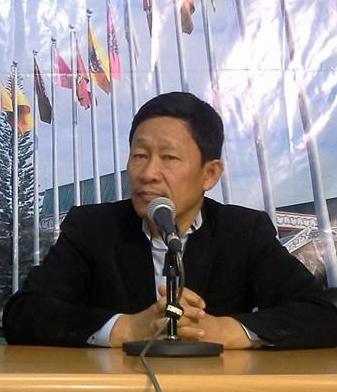

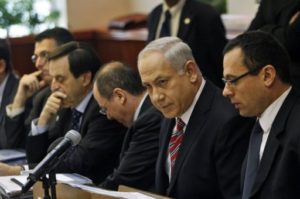


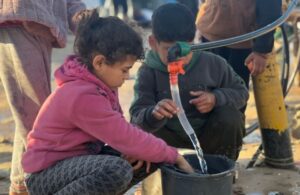
![Israeli tanks and APC’s gather by the Israeli – Lebanese border. Amid Israel’s escalating campaign against Hezbollah in Lebanon on September 30, 2024. [Erik Marmor/Getty Images]](https://en.minanews.net/wp-content/uploads/2024/10/IMG_20241001_203226-300x197.jpg)


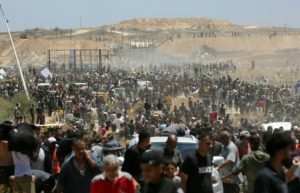
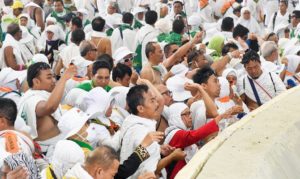
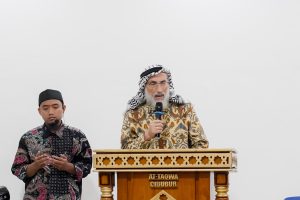

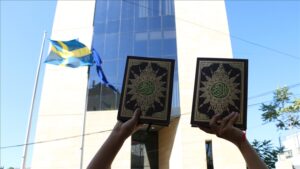
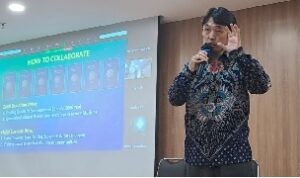







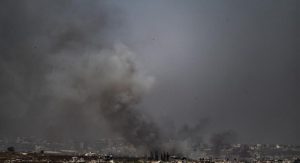








 Mina Indonesia
Mina Indonesia Mina Arabic
Mina Arabic